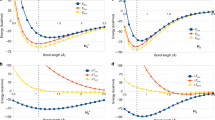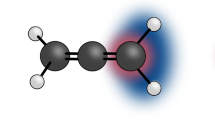Abstract
BY comparing experimental heats of formation with bond energies derived from compounds without alternative Lewis structures, Pauling and Sherman1 deduce resonant structures for carbon dioxide, carbonyl sulphide, and carbon disulphide, of the type: but the impossibility of obtaining a valuation of the bond energies of partially ionic bonds from thermal data does not permit of a more penetrating analysis of the resonance of these compounds along these lines.
This is a preview of subscription content, access via your institution
Access options
Subscribe to this journal
Receive 51 print issues and online access
$199.00 per year
only $3.90 per issue
Buy this article
- Purchase on Springer Link
- Instant access to full article PDF
Prices may be subject to local taxes which are calculated during checkout
Similar content being viewed by others
References
Pauling and Sherman, J. Chem. Phys., 1, 606 (1933).
Gray and Cruickshank, Trans. Far. Soc., 31, 1491 (1935).
Stoner, ” Magnetism and Matter” (Methuen, 1934), p. 274.
Author information
Authors and Affiliations
Rights and permissions
About this article
Cite this article
CLOW, A., THOMPSON, J. Resonance Structures of Carbon Dioxide, Carbonyl Sulphide and Carbon Bisulphide. Nature 138, 802–803 (1936). https://doi.org/10.1038/138802b0
Issue Date:
DOI: https://doi.org/10.1038/138802b0
This article is cited by
-
183Tungsten NMR studies
Zeitschrift f�r Physik B Condensed Matter and Quanta (1975)
-
The Raman spectra of crystal powders
Proceedings of the Indian Academy of Sciences - Section A (1937)
Comments
By submitting a comment you agree to abide by our Terms and Community Guidelines. If you find something abusive or that does not comply with our terms or guidelines please flag it as inappropriate.



